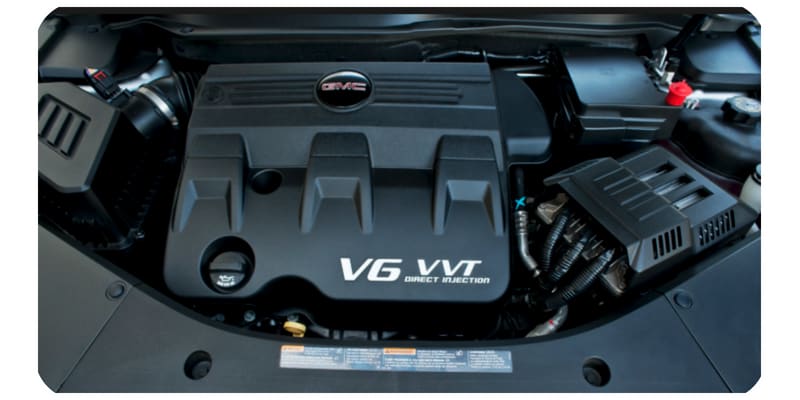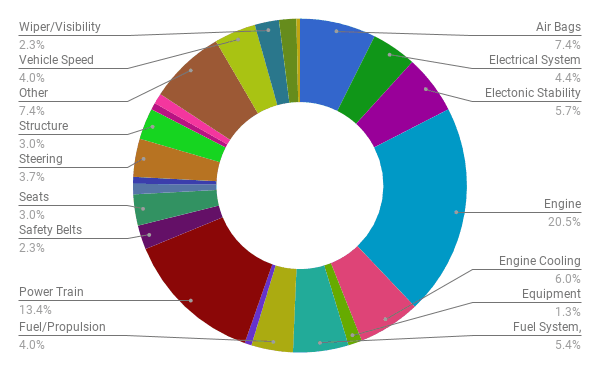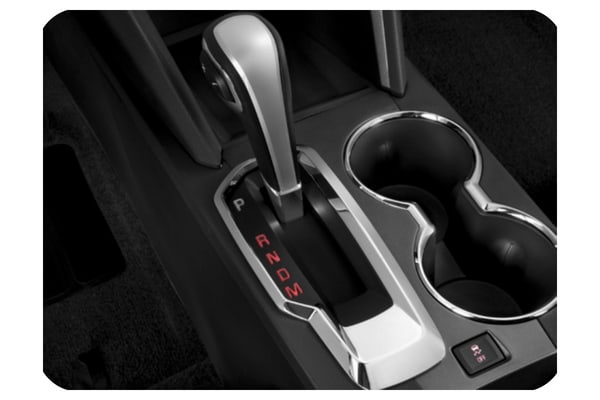This page is meant to give a broad overview of the most common problems with the 2011 GMC Terrain. 2011 is the 2nd model year of this vehicle. The Terrain is built on the Theta platform, which it shares with the Equinox. There’s an emphasis on engine problems and transmission problems, since those are the ones that’ll keep you from moving.
Contents
2011 GMC Terrain Common Issues
There were a total of 206 complaints made to the NHTSA about the 2011 GMC Terrain. Analyzing this data is a great way to determine the most common issues that can happen with your vehicle. 206 complaints out of hundreds of thousands of vehicles is a good sample of what can go wrong, but is not an indication that there are tons of problems with the 2011 Terrain. US News and World Report rates the reliability of the Terrain as AVERAGE.
The Top 5 Areas with Issues are:
- Engine– 20.5% of all reported problems with the 2011 GMC Terrain are related to engine issues. Most of them have to do with an oil leak in the 4 cylinder version.
- Power Train– 13.4% of all problems The powertrain is any part from the engine to where it makes contact with the road through the wheels. This is almost a catch-all category and shouldn’t be cause for alarm. It could be a bad transmission or bad axle shafts that are the cause.
- Air Bags– 7.4% of all issues with the ’11 Terrain have to do with the air bag system.
- Electronic Stability– 5.7% of the issues reported to the NHTSA have been related to the Electronic Stability System. The ESS keeps the car stable by limiting power and the breaks in hard conditions.
- Fuel System– 5.4% of the reported issues have to do with the fuel system. Anything from the gas tank to the fuel injectors will be reported in this category. Think bad fuel filter, fuel lines, or injection.
2011 GMC Terrain Engine and Powertrain Issues

The 2011 GMC Terrain was available with two engines. They were the direct injected Ecotec 2.4L LAF I4 and the 3.0 LF1/LFW V6 engines. The LAF I4 was rated at 182hp and the LF1/LFW was rated at 264hp.
For the most part, they were fairly reliable motors. The number engine problem for this model year is aggressive oil consumption in the four-cylinder version. Here are the most common engine problems with the 2011 GMC Terrain.
Oil Consumption– The reason that the engine causes such a high percentage of problems with the Terrain is oil consumption. The 4 cylinder version leaks oil really bad. It is a known issue. These cars are out of warranty, for the most part. Most of the time, when taken to the dealer, an entire engine rebuild or replace is how they solve the problem.
Stalling– One of the most common issues reported with the 2011 GMC Terrain is stalling out. The problem is that it can stall at speed, which can be dangerous. It’s not nearly as prevalent as the Oil consumption issue.
Chattering on Startup – One of the most common issues with this model year is a chattering sound when trying to fire up the engine. It sounds rough, and will normally only do it for about 10 to 15 seconds after startup.
2011 Terrain Transmission Problems
The 2011 Terrain was equipped with six speed automatic transmissions. They could be manufactured both stateside and in Korea. The 6T45 is a relatively trouble-free transmission. We’ll line out some of the more common problems with it below.
It is considered to be a fill for life transmission. That means that as long as it is operated under normal conditions, it will not require any transmission fluid change. That doesn’t mean that if you are using your Terrain to tow, or for heavy-duty work, that you shouldn’t have it serviced.
Solenoid Problems
Many of the problems that occur with this transmission can be attributed to the fact that it is fully controlled by the engines computer. It uses shift solenoids to accomplish this. When one of them goes bad, it can adversely affect the performance of the transmission.
Here are the main symptoms of a bad Terrain shift solenoid.
- Failure to Downshift– The 6T45E will often fail to downshift if one or more of the shift solenoids are stuck open or closed. This is due to the fact that the transmission fluid cannot be rerouted to the part of the transmission that would be making the next move. To put it simply, it is stuck doing what it was doing when the solenoid failed.
- Delay Going in Gear/ Between Gears– If there is a long pause between gear selection and engagement, it can often be attributed to a faulty shift solenoid. Furthermore, if there seems to be a lot of time between when the transmission exits one gear and enters another, than it’s a pretty good indication of a bad shift solenoid.
- Inconsistent Shifting– Often when a shift solenoid goes bad in the 6T45E, it’ll cause a lot of erratic shift behavior. The transmission will skip gears. It also may act like it is trying to “find the right gear”. Or, to put it another way, it’s can’t quite settle on the right gear.
- Stuck in Neutral– If a shift solenoid has failed entirely, that it’s entirely possible that the transmission will not work at all. In this situation the transitional will remain a neutral regardless of what gear you put it in.
Most of the problems that occur with a 6T45 shift solenoid are caused by the coil wire going bad in some way. It can go bad in a couple of ways. The plunger can also get stuck. We’ll cover the why and the how here.
You can test the solenoids with an OHM meter. You should be looking for 20-30 ohms of resistance. If no resistance is found, than you know that the solenoid is bad, and that it is broken. If the reading is less than 20 ohms than it’s probably melted. There’s more on both of those conditions and what causes them directly below.
- Broken Solenoid Coil Wire– In the event that the a solenoid coil wire breaks in your 2011 GMC Terrain transmission, the solenoid will no loner be able to create the magnetic field. A broken shift solenoid wire is going to be caused by a lot of harsh vibration, or high voltage that’s out of the normal range.
- Melted Solenoid Coil Wire– The results of a melted solenoid coil wire are the same as a broken one, the difference is going to be the conditions that caused the wire to melt. Whereas a broken coil wire is likely to be caused by vibration or high voltage, a melted one is going to be caused extreme transmission temperature or high voltage.
- Plunger Stuck– The solenoid plunger is an area of failure in the 6T45E. Unlike when the shift solenoids are melted or broken, a stuck plunger can be repaired. Shift solenoids are not expensive. It would be a good idea to replace it if you can afford it. This will keep you from getting under the truck next time the plunger decides to get stuck.A stuck plunger is almost always caused by dirty transmission fluid or debris in the case. You’ll have to replace the transmission fluid anyway, but it’s a good idea to go ahead and change the filter as well. This will really help increase the odds that you won’t be making this repair again anytime soon.
- Broken/Stuck Spring– There is a spring in the shift solenoid that moves the plunger forward, when it is damaged that movement cannot happen.
Trouble Codes
One of the greatest benefits to a fully electronic transmission is all of the great data that they gather and store in the computer. You can use this information to laser pinpoint exactly what part of the transmission may be failing. Here is a great glossary of all 6T45 trouble codes from Transmission Builders Network.
The great thing about using the trouble codes to diagnose the problems with your 2011 GMC Terrain transmission is that it takes almost all of the guess-work out of it.
Hunting for Gears
Many folks complain a lot about the 6T45 hunting for gears. In a quest to hit ever tightening CAFE fuel economy regulations, the 2011 GMC Terrain will shift A LOT. This doesn’t necessarily indicate that there is anything wrong with the transmission itself. It just takes a little getting used to.
If you feel like it is hunting for gears even more than it was, you may need to have the transmission control module replaced.
NHTSA Recalls: 2011 GMC Terrain
There were 3 recalls issued by the NHTSA for the 2011 GMC Terrain.
Key May Be Removed in Gear– Typically, the ignition key should only be removable while in park. This helps to eliminate any vehicle roll aways. GM Recall #50491 or #50490
Seat Height Adjuster Bolt can Fall out– This recall is only applicable to vehicles with power height adjustment. The bolt may come out and the drivers height in relation to the wheel may lower. This can lead to an increased chance of crashing. GM recall # 14271
Safety Belt Anchor– The software that controls the defrost system can fail. When it does visibility may be compromised. Gm recall #100370
If you are would like to schedule service for any recall, or confirm that they have been done, contact GMC customer service at:
1-800-630-2438
-or-
You may also wish to check out 2011 Chevy Equinox Problems, since they share the same platform.



